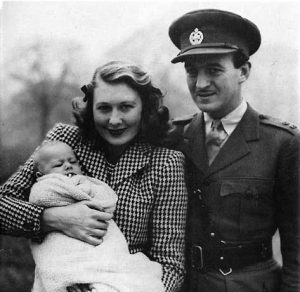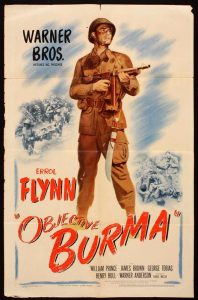Per corollary of the ‘Objective Burma’ controversy, it is sometimes alleged that Errol harboured anti-British sentiments and vice versa. In fact, he was an ardent admirer of Churchill, and, as we know, the King and Queen.
This erroneous impression arose from two things, neither of which were Errol’s fault. The first was press speculation as to why he did not join up when Britain declared war on Germany (he was, after all, Tasmanian), and a few years later, why he did not join up when the US entered the war.
I am afraid that ‘anti-Errol’ prejudice was fuelled by his former friend, colleague and housemate, David Niven.
Niven came from a military background and had been educated at Stowe House (England’s first ‘progressive’ boarding school, but not quite progressive enough for the young Niv ,who was as sexually precocious as Errol).
After leaving Stowe he joined a Scottish regiment, before deciding on a career in acting. In Hollywood, however, he remained very ‘British’ and never took out US citizenship.
Deeply patriotic, when Britain declared war on Germany, Niven returned to England at once to take up his commission. He also let it be known, in private, that he believed ‘others in Hollywood’ – it was easy to guess to whom he referred – were guilty of dereliction of duty. Errol was Australian and in those days, when Australia was still part of the Empire, it counted as being British.

Lieutenant-Colonel Niven with his first wife, Primula Rollo.
Later, after Errol’s death, the usually affable Niven returned to the subject in his rather brilliant memoir of Hollywood, ‘Bring on The Empty Horses.’ .
This was the sequel to the bestselling ‘The Moon’s A Balloon’ , which vies with Errol’s ‘My Wicked, Wicked Ways’ as the best autobiography by an actor. I will stick my neck out here and say that Niven, stylistically, was a better writer – though less profound. I am judging this not on ‘My Wicked, Wicked Ways’, as we don’t know how much was written by Errol and how much by Earl Conrad, but on ‘Beam Ends.’
Niven devoted a whole chapter to Errol. Most of it is affectionate, yet because of this one incident when Errol seemingly ‘chose not to fight for his country’, there is a sour note and the general reader not versed in Flynnography would have had the impression that the lovable, good-eggish Niven regarded Errol as as a highly amusing 18-carat shit.
Sadly, very few people in the US , and probably no-one in the UK at that time, were aware of how desperate Flynn had been to enlist. Had Niven known the truth, he would have behaved quite differently.
But it is indubitably true that the controversy surrounding Errol’s ‘war record’, had not been helped by ‘Objective Burma’.

The film, as we have noted, had Winston Churchill and other senior politicians, as well as the British press and public foaming a la bouche.
It matters not one hill of beans if politicians or newspaper editors are upset. It is part of their job. Ordinarily, little upset Churchill – at least not in public. But what got under his skin – and he was a quarter American himself – was the very real anguish felt by British soldiers and the families of British war dead.
It has been asserted again and again, by both British and US military historians, that Burma was a British and Australian theatre of war, not an American one, and that the British incurred heavy losses there. The majority of Allied forces in Burma were British, South African, Australian, Indian and Chinese. The film caused offence not only in Britain, but in Singapore. Nor did it go down well with the Australians.
But the film was not banned in Britain and Singapore, as I originally and mistakenly suggested. Warner Bros pulled it from release in the UK after one week, horrified and dismayed by the offence it caused. The film was re-released in Britain in 1952, but only with a grovelling disclaimer.
Of course the British press was quite wrong to take its ire out on Errol. All blame lay with Warner Bros, but it is always more profitable to be iconoclastic – especially when the icon to be toppled had made his career out of portraying action heroes in the cinema. Errol was an easy target, already notorious in his personal life, and a ‘shirker’ to boot.
A leading English newspaper printed a cartoon with the line: ‘Excuse me, Mr Flynn, but you are treading on some graves.’ From what I have heard and read, Errol was very distressed by this, and as a result, turned a bit sour on ‘Objective Burma’ (though he did regard it as one of his best dramatic performances), but was, of course, unable to defend himself.
Over ‘ere, Errol was ‘rehabilitated’ a long time ago. He is also taken very seriously as an actor. The Guardian newspaper recently ran a piece praising Errol as a man, a writer and an actor, and six months ago there was an Errol Flynn season on the BBC with commentary by some very distinguished people.
Christopher Lee, shortly before he died, narrated a very good documentary on Errol, commissioned by British television, which set the record straight and shows Flynn in an almost shining light. In fact, Flynn has never been so ‘In’.
And how can Brits not love him? No other film star personified English ‘chivalry’ the way Errol did, not to mention what is called ‘English Exceptionalism.’
‘Objective Burma’, however, cannot be rehabilitated as a ‘factually based’ film on any level, and was, to put it mildly, a little impolite to America’s Allies.
The Guardian, which is a left-leaning broadsheet, and if anything, tends to mock or denigrate British military achievements, wrote the most balanced, recent article on the subject of the film. Yes, it was a great war movie, but it was horribly insensitive and should not have been released so quickly, when British wives, mothers, and children were mourning the loss of their men.
(An interesting note. Lester Cole, who co-wrote the script, became notorious himself a few years later when HUAC accused him of ‘Un-Americanism’, and he became one of black-listed ‘Unfriendly Ten.’ Perhaps ‘Objective Burma’ was jinxed?)
Here is a link to the article
— PW

David DeWitt
March 11, 2017 at 5:28 pm
There is an interview with Niven somewhere on YouTube in which Niven learns Errol tried all of the branches. They had of course been very close during the time of his first wife’s accidental death …
PW
March 11, 2017 at 8:02 pm
That is fascinating, David. How did Niven react, and why wasn’t the chapter on Errol corrected as a result?
David DeWitt
March 12, 2017 at 4:56 am
I am trying to find the clip. I think he says something like “poor old boy” and if I am not mistaken the books may not have been written at the time and Niven may have forgotten the interview …
Gentleman Tim
March 12, 2017 at 11:53 am
Say it ain’t so, David.
[img]https://media1.giphy.com/media/F0ybqSzM1WaEE/200w_d.gif#28[/img]
[img]https://s-media-cache-ak0.pinimg.com/564x/17/b7/12/17b7126bf60615e0d95cc4b5e113ccbf.jpg[/img]
Gentleman Tim
March 13, 2017 at 11:04 am
Anti-Stalinist Colonist calling, PW.
I want to thank you so much for all this absolutely magnificent research, info, and writing. You English are exceptional, indeed! And you so particularly, PW. Brava for you nobly standing up for all the Great things Great Britain has done. It is simply astonishing what that island of yours has done to advance the world.
What you’re posting for all of us here provides such an informed description of the social and political milieu that informed Errol himself. One can see his range of feelings about it in Blood, in Hood, and in Boots (and that’s just the double-o movies.)
I think Errol would have been tremendous portraying revolutionary figures against the Crown, too. Historical characters like Sam Adams. Because of their loyal (and royal) British audience, however, I think Warners steered clear of that. If I call correctly, he was considering portraying Nathan Hale, but that was nixed.
He would have really liked you.
Using your talents and energies to tribute your Father and country is a beautiful thing to watch. I’m sure your Dad is beaming with pride up there in the very distinguished Raj section of Heaven.
Thank you, Lady P.
PW
March 13, 2017 at 8:56 pm
You are shameless flatter and as with Disraeli, it will get you everywhere! Seriously though, I do thank you very much indeed for your immensely kind and wholly underserved words.
Yes, Errol would have been wonderful playing a real life rebel against the Crown – with the notable exception of Oliver Cromwell. Errol as Borewell? I think not.
British monarchs have been rebelled against by Brits in Britain (as opposed to those who lived in the Colonies), time and again. Our Civil War was every bit as bitter as yours. Because ours was a war about religion, and the rights of Parliament vs the ‘divine right’ of Kings, it divided and destroyed countless families. To give a famous example, Milton’s wife, Marie, left him because he was a Parliamentarian and she was a Royalist.
There is one English rebel that I think Errol could have played to perfection, however. Their characters and tastes – as well as the effect they had on women – were so alike they might have been twins, or if you believe in reincarnation, Errol was this man reincarnate.
I will do a post about this later on, as I have often felt it could have been the Flynnster’s finest role.
timerider
March 17, 2017 at 4:12 pm
So, it was Errol’s destiny to be an adventurer and the nitty gritty reality of this planet caught him unaware at times.
Malaria did it’s dirty work on him and he burned his candle very brightly to a dry wick. It must have hurt him deeply to be turned down by all services in the conflict of WWII.
As for contract it seems one may be stuck in a film that may not be so flattering to all involved. As for the “Crown” and the royals I have many bones to pick. I love Canada, Australia, Taz, Kiwi town and all the islands. True that the 7th world empire that followed Rome did spread many good things to the world. However there seems to be a new world order vying for control over it all now.
USA may never get out of debt to the Crown.
At 70 I may not be going to OZ anytime soon but my heart is ther sometimes The isle of Zeal is so wonderfully beautiful and I hope it stays set apart. Oh well I digress…..